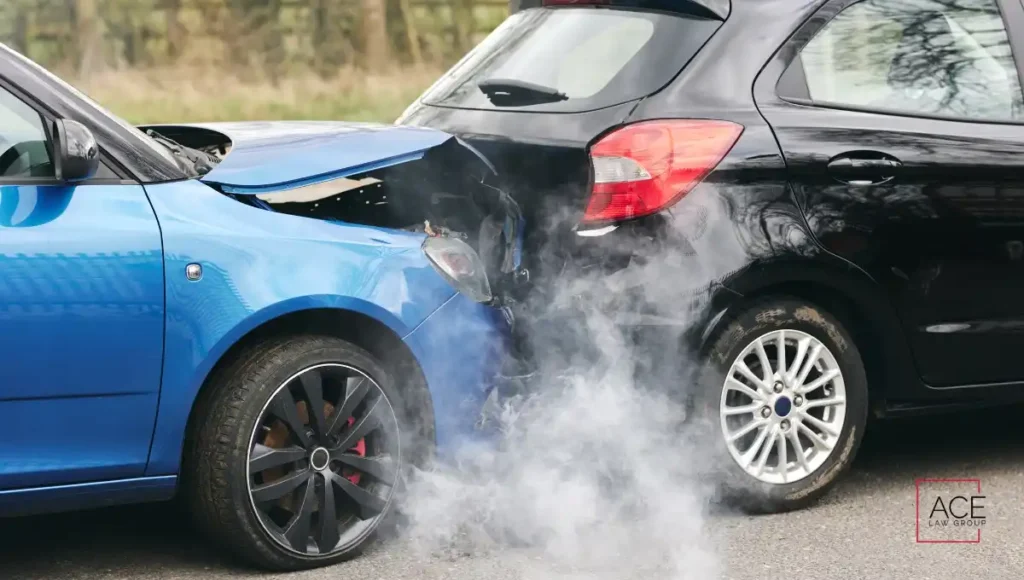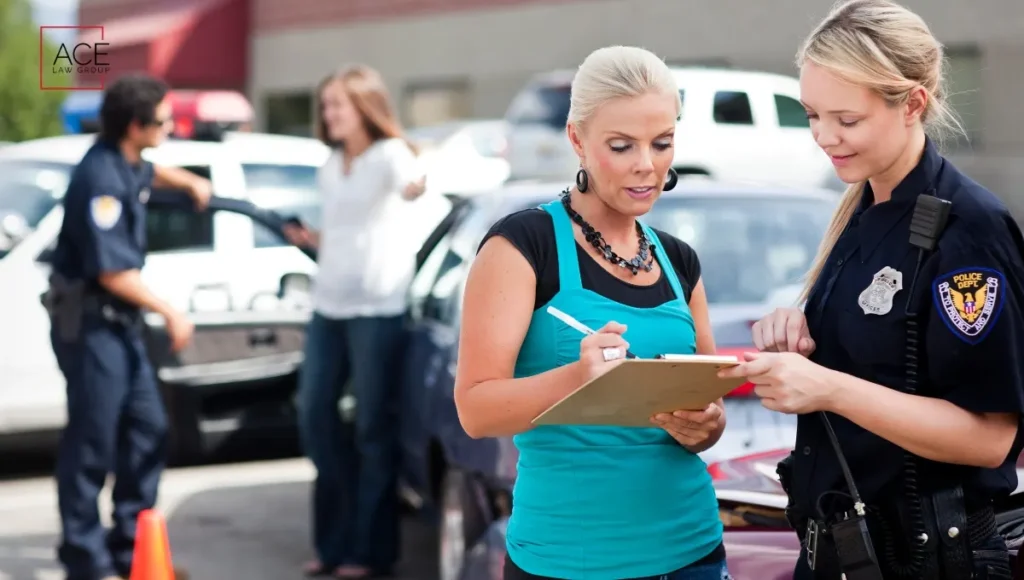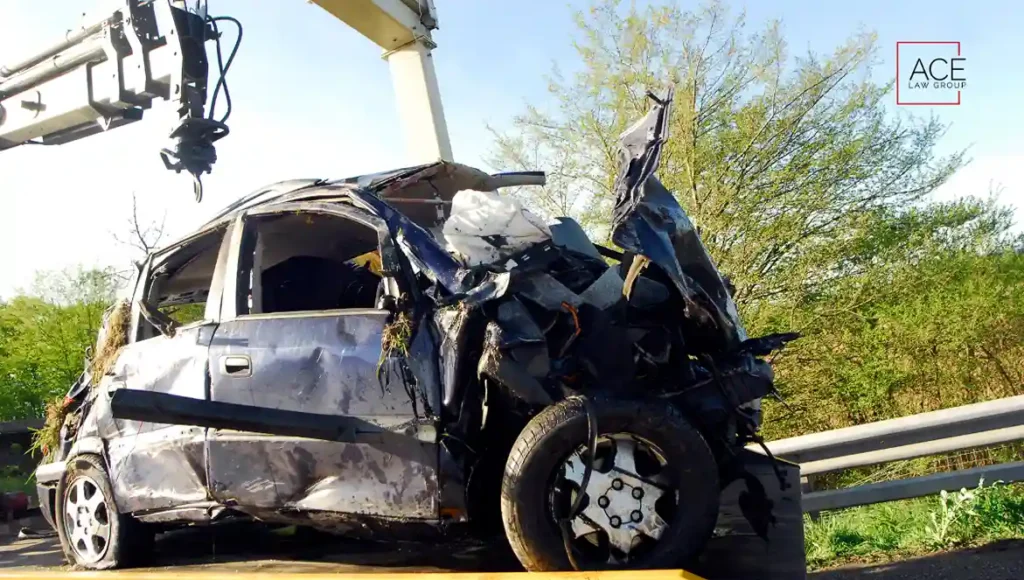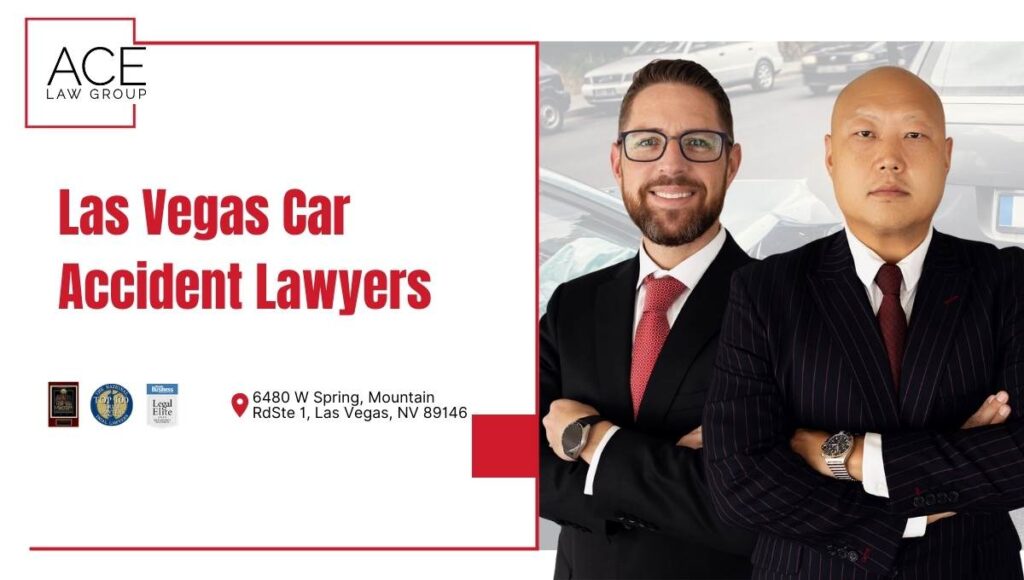A car accident in Las Vegas can do more than scratch your paint – it can upend your day, hit your wallet hard, and turn into a frustrating back-and-forth battle with insurance companies.
From small fender benders to serious collisions, Property Damage Claims in Las Vegas Car Accidents rarely go smoothly. Insurance companies often challenge liability, minimize payouts, or postpone claim decisions.
Nevada’s fault-based insurance laws make the process more difficult when the at-fault driver is uninsured or denies responsibility. These situations usually lead to prolonged claims, legal pressure, or out-of-pocket repair costs.
This comprehensive guide explains your rights, outlines the step-by-step insurance claims process for Nevada, and identifies costly mistakes to avoid.
Recent Case Result
We secured a $5 Million settlement for a client injured in a car crash.
Our legal team fought to recover full compensation for medical expenses, lost wages, and pain and suffering.
Call Us Now: (702) 333-4223What Qualifies as Property Damage in a Las Vegas Car Accident?
Property damage in a Las Vegas car accident refers to any physical damage to your vehicle or personal items caused by a crash.
Common Examples of Property Damage
- Vehicle damage: Cracked windshields, shattered windows, dented doors, broken lights, or deployed airbags
- Personal item damage: Destroyed laptops, phones, tools, or bags inside the vehicle
- External property damage: Collisions with fences, mailboxes, garages, gates, or buildings
This type of damage commonly occurs on public roads, in parking lots, or on private property. If your vehicle crashes into someone’s home or business, the resulting repair costs are considered property damage under Nevada law (NRS 487).
Levels of Property Damage
- Minor: Superficial issues like small dents, scratches, or chipped paint. Typically $750 or less to repair.
- Major: Significant damage such as frame distortion, engine failure, or a total loss of the vehicle. Typically in excess of $750 to repair.

What Evidence Do You Need to Prove Property Damage?
Start collecting evidence immediately – the sooner, the better. Complete documentation reduces the chance of denial and speeds up claim approval.
Here’s what you need to gather:
- Take visual evidence
Capture multiple photos and videos of all vehicle damage. Include pictures of the accident scene, skid marks, debris, and damaged personal items inside the vehicle. Once the accident scene begins to be cleared by authorities, this evidence will no longer be readily available or even disappear entirely. - Get written repair estimates
Request detailed quotes from two or more ASE-certified auto repair shops. These estimates must describe the type, extent, and cost of damage. - Request a police report
Ask for a copy of the official accident report from law enforcement. This document confirms the date, time, and parties involved, and often yields an initial fault determination from the reporting officer on-site. - Keep all related receipts
Save every receipt tied to the accident, including:- Auto repairs
- Towing services
- Rental car expenses
- Replacement of damaged personal items
- Medical receipts related to injuries sustained in the crash (These help support the overall impact of the accident, even if your main focus is property damage)

Who Pays for Property Damage After a Car Accident in Las Vegas?
Since Nevada is an at-fault state, the at-fault driver is legally responsible for paying property damage costs after a car accident. Their liability insurance covers the costs up to policy limits.
If the at-fault driver is uninsured or underinsured, you can file a claim through your collision coverage or uninsured motorist property damage (UMPD) coverage, if included in your policy.
In multi-vehicle or disputed-fault cases, insurance companies may investigate and assign shared liability, which can affect how much each party pays.
Nevada Laws on Property Damage Claims
Under Nevada law, property damage claims must follow strict deadlines, fault rules, and court procedures. Understanding these rules is essential to protect your rights and avoid losing compensation. Below are the key legal guidelines that affect property damage claims after a car accident:
- Statute of Limitations: You have 2 years from the date of the accident to file a property damage lawsuit in Nevada. If you miss this deadline, the court will reject your claim regardless of if you have a strong case.
- Comparative Negligence: Nevada follows a modified comparative negligence rule. If you’re 50% at-fault, you can still recover damages, however, compensation will be reduced by the percent of your fault. For example, 20% fault = 20% less compensation.
- Legal Options:
- Small Claims Court: For claims under $10,000, this is a faster, low-cost route.
- Civil Court: If your damage is extensive or the fault is contested, file a civil lawsuit.
How Long Does It Take to Settle a Property Damage Claim in Las Vegas?
Most property damage claims in Las Vegas settle within 2 to 6 weeks, especially if the accident is minor and the fault is clear. For example, an uncontested fender-bender with photos and estimates can wrap up in under a month.
However, disputed or complex cases can stretch into several months, especially if:
- The fault is unclear.
- Injuries were incurred by multiple parties.
- The insurer requests more documentation.
- You’re dealing with an unresponsive or slow insurance company.
Red Flags That Signal a Delayed Claim
- Your claim remains open for more than 30 days with no explanation.
- Communication from the insurer stops unexpectedly.
- You receive a lowball offer far below your repair estimate.
If any of these issues occur, contact a Las Vegas property damage attorney immediately. Qualified Las Vegas car accident attorneys can pressure insurers, push the claim forward, and help you recover the full amount to which you’re entitled.
How to File a Property Damage Claim in Las Vegas
Filing a property damage claim in Las Vegas requires a 7-step process to ensure proper documentation, liability support, and maximum compensation.
Step 1: Document Everything
Capture the scene. Take wide and close-up photos of all damage, skid marks, and debris, as well as the surrounding area and weather conditions. Don’t forget to photograph any damaged personal belongings inside the car.
Step 2: File a Police Report
Report the accident to the Las Vegas Metro Police immediately, especially if the total damages are expected to exceed $750 or if anyone is injured. The police report is critical evidence for determining fault and claim approval.
Step 3: Get Witness Statements
Collect names, phone numbers, and written or recorded statements from anyone who saw the crash. Witnesses help establish fault and support your version of events.
Step 4: Notify Your Insurer
Contact your insurance company and report the accident as soon as possible. Provide only factual information, and avoid admitting fault or speculating.
Step 5: Contact At-Fault Driver’s Insurer
If another driver caused the accident, file a third-party claim with their insurance provider. Submit all relevant documentation: your police report, repair estimates, and photo evidence.
Step 6: Negotiate the Settlement
Once the insurer reviews your claim, they will issue an offer. Initial offers are often 10–30% lower than the actual repair value. Use receipts, estimates, and damage documentation to negotiate. Consider speaking to a Las Vegas property damage attorney before accepting any settlement.
Step 7: Go to Court (if necessary)
If negotiations fail or the insurer denies your claim, file a lawsuit. For claims under $10,000, small claims court is available. For higher-value or disputed cases, file a civil lawsuit with legal representation.
Can You Claim Property Damage Without a Police Report in Nevada?
Yes, you can file a property damage claim without a police report in Nevada, but doing so severely hampers your case.
What the Law Requires
Under Nevada law (NRS 484E.070), you’re required to file a police report if the accident caused:
- Injury or death, or
- Property damage exceeding $750
Failing to report in these situations can result in fines or license suspension. Even though the law does not require it, not having a police report will weaken your claim, especially if the other driver denies fault or the insurer pushes back.
How to Support a Claim Without a Police Report
Without a report, you’ll need stronger supporting evidence, such as:
- Clear photos and videos of vehicle damage, road conditions, debris, and any contributing factors, along with media timestamps showing when the pieces of visual evidence were recorded.
- Witness statements that confirm the facts of the incident.
- Detailed repair estimates or mechanic assessments showing the extent and cost of damage.
We always recommend filing a police report, even for minor accidents, as it strengthens your position, adds credibility, and helps avoid delays or disputes.
Common Mistakes to Avoid in Property Damage Claims
Even minor errors can reduce your payout or delay your claim. Here are the six most common mistakes Las Vegas drivers make and how to avoid them:
- Not Documenting the Damage Thoroughly
Failing to take photos, and videos, or collect repair estimates prevents insurers from accurately assessing the value of your claim. Always document all visible and hidden damage immediately after the accident. - Delaying the Claim
Waiting more than 24–48 hours to report an accident often triggers suspicion. Insurers may question the severity or deny coverage entirely. File your claim promptly to protect your payout. - Blindly Trusting the Insurance Adjuster
Insurance adjusters work for the insurer, not for you. Their job is to minimize payouts. Always verify estimates, review offers carefully, and consider legal advice before agreeing to anything. - Overlooking Hidden Costs
Towing fees, storage charges, and rental car expenses are all claimable under Nevada law, but many forget to include them. Add every qualifying expense with proper documentation to avoid out-of-pocket losses. - Skipping the Police Report
Without an official accident report, your property damage claim becomes harder to verify, especially if the other party disputes fault. File a report even in minor accidents to strengthen your case. - Not Following Up
Insurers often delay responses or stop providing updates. Don’t assume progress is being made. Follow up regularly, document every call or email, and keep a log of all interactions. Proactive communication helps resolve your claim faster.
What Happens If Your Car Is a Total Loss in Nevada?
In Nevada, your car is considered a total loss if the cost to repair it equals or exceeds its fair market value. The insurance company determines this after inspecting the damage.
What Happens After Your Car is Totaled
Once the car is declared totaled:
- You sign over the vehicle title to the insurance company.
- You receive the fair market value minus your deductible.
- The vehicle receives a salvage title, and it cannot be legally driven unless rebuilt and inspected.
- If you have a loan, the payout goes to your lender first.
- If there is a gap between what you owe and what’s paid, GAP insurance covers the difference -if you have this coverage type.

How Fair Market Value Is Determined
Insurers calculate your car’s actual cash value (ACV) based on factors like:
- Year, make, and model
- Mileage
- Pre-accident condition
- Comparable vehicle listings in your area within the past 30 days
Example: If your car’s repair costs total $8,000, but the ACV is $7,500, it will be declared a total loss.
How to Dispute the Valuation
If you believe the insurer undervalued your car, take these steps:
- Get an independent appraisal from a licensed mechanic or auto expert.
- Submit recent listings showing similar vehicles (same year, make, mileage, and condition).
- Provide service records to demonstrate excellent maintenance or added value.
How to Calculate Fair Compensation for Property Damage
Fair compensation goes beyond just fixing your car. In Las Vegas as well as surrounding Southern Nevada cities like Henderson, Summerlin, Spring Valley, and Boulder City, insurance companies consider several factors when determining your property damage payout. Here’s how it breaks down:
- Repair vs. Replacement Cost
If your car is repairable, the insurer pays for the repair estimate. If the cost to repair equals or exceeds your car’s actual cash value (ACV), the vehicle is declared a total loss.
Example:- Repair cost = $9,200
- Vehicle ACV = $9,000
- Result: The car is totaled, and the insurer pays the ACV minus your deductible.
- Diminished Value
Even after repairs, your car may lose its resale value. Diminished value is the difference between your car’s pre-accident market value and its value after repair, and it’s a claimable loss in Nevada.
Example:- Pre-accident value = $15,000
- Post-repair value = $13,000
- Diminished value = $2,000 (can be added to your claim)
- Rental Car Costs
You’re entitled to a comparable rental vehicle while your car is being repaired or until a total loss payout is issued.- Save all rental receipts.
- Ensure the at-fault driver’s insurance policy covers rental costs.
- Towing and Storage Fees
Towing and storage fees are fully reimbursable but frequently overlooked.
You can claim:- Tow truck charges (average $100–$300 in Las Vegas)
- Daily storage yard fees (often $40–$75/day)
- Depreciation
If your vehicle is totaled, compensation is based on its actual cash value, not the original purchase price.
Example:- New price = $28,000
- Market value after 2 years = $20,000
- Insurer payout = $20,000 (minus deductible)
When to Hire a Las Vegas Car Accident Lawyer
Not every claim requires a Las Vegas car accident lawyer, but in many cases legal help can be the “make-or-break” between a fair payout and a frustrating loss.
Hire a Car Accident Lawyer If:
- The other driver denies fault, or the insurer disputes liability.
- Legal representation helps prove responsibility and hold the insurer accountable.
- You receive a low settlement offer.
- If the insurer offers less than your repair, rental, or replacement costs, a lawyer can negotiate for full value.
- The at-fault driver is uninsured or underinsured.
- Legal help is critical in recovering compensation through your policy or other legal channels.
- Your damages exceed $5,000.
- Larger claims involve more scrutiny and negotiation. A lawyer can prevent payout reductions or denials.
- The insurer delays the process or stops communicating.
- If more than 30 days pass with no action, or you feel pressured to settle quickly, legal pressure helps move the claim forward.

How a Las Vegas Car Accident Lawyer Can Help
Dealing with property damage after a car accident is stressful, especially when insurance companies delay, underpay, or deny your claim. A skilled lawyer can take over the process and fight for the full compensation you deserve.
Here’s how a car accident lawyer adds real value:
- Investigates Fault Thoroughly
- Gathers crash reports, eyewitness statements, and expert opinions to prove who caused the accident and support your claim.
- Collects and Organizes Critical Evidence
- Builds a strong case using photos, repair estimates, receipts, and documentation that insurers can’t ignore.
- Assesses the True Value of Your Claim
- Calculates repair or replacement costs, diminished value, rental expenses, towing, and storage fees – not just what the insurer wants to cover.
- Negotiates with Insurance Companies
- Pushes back against lowball offers and delays using legal leverage and deep knowledge of Nevada law.
- Represents You in Court If Needed
- Files a lawsuit and advocates for you if the insurer refuses to pay what’s fair.
FAQs About Property Claims in Las Vegas Car Accidents
What are the fees of car accident lawyers in Las Vegas?
Las Vegas car accident lawyers usually charge a contingency fee of 33% to 40% of your final settlement or court award. In property-only claims, some may offer hourly rates instead. Most initial consultations are free.
Are insurance companies fair in property damage claims?
No, insurance companies are not always fair. They frequently undervalue claims, delay payment, or dispute liability, especially if your documentation is weak or you don’t have legal representation.
How much can I recover for my car’s property damage in Las Vegas?
You can recover the cost of repairs, or if the vehicle is totaled you can recover its fair market value. You may also claim for diminished value, rental car fees, towing fees, and storage fees.
How long does it take to settle a property damage claim?
Uncontested claims usually settle in 2–6 weeks. Disputed or complex claims can take several months, especially if liability is unclear or evidence is missing.
What if the at-fault driver is uninsured?
If the at-fault driver is uninsured, you must rely on your uninsured motorist property damage (UMPD) coverage, if included in your policy. Without UMPD, your only option is to sue the driver, but collecting payment can be difficult if they lack assets.
Does Las Vegas have no-fault insurance?
No. Nevada is an at-fault state, meaning the driver who caused the accident is responsible for covering damages through their insurance.
Get the Compensation You Deserve for Property Damage
Dealing with property damage after a car accident in Las Vegas is never easy – especially when insurers delay, dispute, or undervalue your claim. But with the right knowledge and support, you don’t have to settle for less.
Whether your car was scratched or totaled, and whether you incurred towing and rental fees, you have the right to be compensated fairly and fully.
At Ace Law Group, we’ve helped countless Nevada drivers just like you recover what they’re owed. If your claim is being ignored, lowballed, or delayed, don’t wait to reach out.

Contact us today for a free consultation and let us fight for what’s yours.